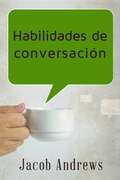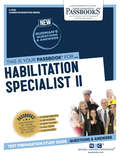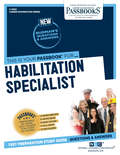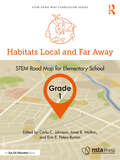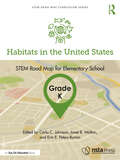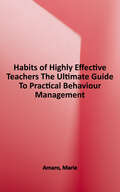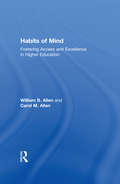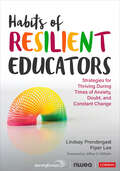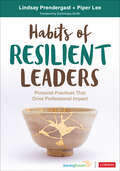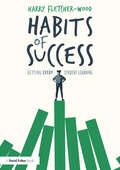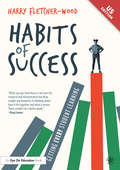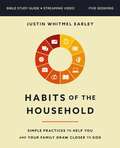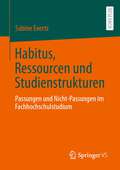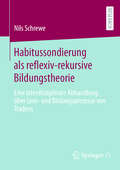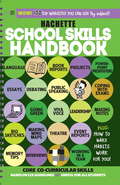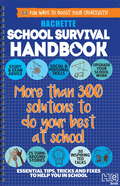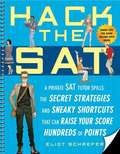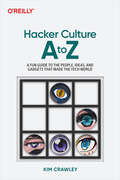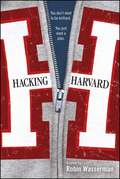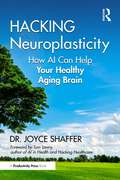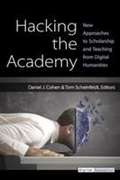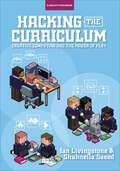- Table View
- List View
Habilidades De Conversación: Construir Relaciones Exitosas Sin Esfuerzo
by Jacob Andrews Paola Cuenca¿Teme iniciar una conversación? ¿Alguna vez quiso hablar con alguien pero no supo qué decir? ¿Se sintió incomodo al conocer a alguien por primera vez? ¿Piensa que la conversación casual es una pérdida de tiempo?Si la respuesta a estas preguntas es sí, ¡Éste libro es para usted!Esto es lo que aprenderá al leer Habilidades de Conversación:-Convertirse en un conversador efectivo-Causar una buena primera impresión-Crear comunicación mediante habilidades de conversación casual-La importancia de la comunicación no verbal y como sacar ventaja de la misma-Tratar con la ansiedad social-Tácticas para superar el temor a hablar con individuos y grupos-Crear una conexión con la otra persona-Utilizar rompehielos para iniciar una conversación-Mantener viva la conversación y hacer ha hablar al otro-Cómo poner fin a una conversación-Conversar con confianza-Nunca mas quedarse sin palabrasEl ser bueno para la conversación es una habilidad poderosa. Resultará ser invaluable cuando se encuentre en una entrevista laboral, una fiesta, o quiera abordar a alguien que cree que podría ser un futuro compañero romántico.
Habilitation Specialist II: Passbooks Study Guide (Career Examination Series)
by National Learning CorporationThe Habilitation Specialist II Passbook® prepares you for your test by allowing you to take practice exams in the subjects you need to study. It provides hundreds of questions and answers in the areas that will likely be covered on your upcoming exam, including but not limited to: coding information; developing and implementing habilitation plans; supervision; understanding and interpreting written material; and more.
Habilitation Specialist: Passbooks Study Guide (Career Examination Series #C-2900)
by National Learning CorporationThe Habilitation Specialist Passbook® prepares you for your test by allowing you to take practice exams in the subjects you need to study. It provides hundreds of questions and answers in the areas that will likely be covered on your upcoming exam, including but not limited to: coding information; developing and implementing habilitation plans; understanding and interpreting written material; understanding individuals with developmental disabilities; and other related areas.
Habitats Local and Far Away, Grade 1: STEM Road Map for Elementary School (STEM Road Map Curriculum Series)
by Carla C. Johnson Erin E. Peters-Burton Janet B. WaltonWhat if you could challenge your first graders to imagine saving an endangered species, learning about different global habitats along the way? With this volume in the STEM Road Map Curriculum Series, you can! Habitats Local and Far Away outlines a journey that will steer your students toward authentic problem solving while grounding them in integrated STEM disciplines. Like the other volumes in the series, this book is designed to meet the growing need to infuse real-world learning into K–12 classrooms.This interdisciplinary, four-lesson module uses project- and problem-based learning to help students develop an action plan to encourage preservation of an endangered species. Students will work in teams to describe the habitat characteristics of a species outside their home region, explain why the species is endangered, and offer solutions about how humans might be able to support this species’ survival. In developing their plan, they will act as explorers of species locally and around the world, learning about climate, plant and animal inhabitants, and key factors affecting habitat vitality or decline.To support this goal, students will do the following: Explain that there are various types of habitats that vary with geographical location around the world Identify several habitats in the U.S. and globally Explain how various habitats meet animals’ basic needs Identify climatic characteristics of several habitats Identify humans as species that live within and in interaction with various habitats Identify technological advances and tools that scientists use to learn about habitats and endangered species Design and construct models to demonstrate understanding of features of various habitats (local and global) and endangered species Apply their knowledge of habitat characteristics, interdependence in ecosystems, and endangered species to develop an action plan to help preserve their selected endangered species The STEM Road Map Curriculum Series is anchored in the Next Generation Science Standards, the Common Core State Standards, and the Framework for 21st Century Learning. In-depth and flexible, Habitats Local and Far Away can be used as a whole unit or in part to meet the needs of districts, schools, and teachers who are charting a course toward an integrated STEM approach.
Habitats in the United States, Grade K: STEM Road Map for Elementary School (STEM Road Map Curriculum Series)
by Carla C. Johnson Erin E. Peters-Burton Janet B. WaltonWhat if you could challenge your kindergarten students to compare their local habitats with other habitats in the United States? With this volume in the STEM Road Map Curriculum Series, you can! Habitats in the United States outlines a journey that will steer your students toward authentic problem solving while grounding them in integrated STEM disciplines. Like the other volumes in the series, this book is designed to meet the growing need to infuse real-world learning into K–12 classrooms.This interdisciplinary, three-lesson module uses project- and problem-based learning to help students look at their own neighborhood, city, state, and beyond to learn about the geography and habitats of various regions of the United States. Students will gather information on habitats and their similarities and differences based on weather, climate, and the animals, plants, and people residing there, to develop a reference manual for local zoo officials reorganizing their animal displays.To support this goal, students will do the following: Explain that there are different types of habitats in different parts of the U.S. Explain how various habitats sustain animals and plants Identify climatic characteristics of several habitats Apply their knowledge of habitats to develop a reference guide about habitats in the U.S. Utilize technology to gather research information and communicate Identify technological advances and tools that scientists use to learn about sustainable systems Design and construct models of habitats Understand local weather patterns and make connections among weather patterns and plant and animal life where they live The STEM Road Map Curriculum Series is anchored in the Next Generation Science Standards, the Common Core State Standards, and the Framework for 21st Century Learning. In-depth and flexible, Habitats in the United States can be used as a whole unit or in part to meet the needs of districts, schools, and teachers who are charting a course toward an integrated STEM approach.
Habits of Highly Effective Teachers: The Ultimate Guide to Practical Behaviour Management That Works!
by Marie AmaroWhat do I do when students won't stop talking? <p>How can I stop students wasting time and disrupting other students? <p>What can I do about disrespectful students? Sound familiar? <p><p> Difficult student behaviours can keep you awake at night! Effective classroom management can feel elusive and you feel isolated and incompetent dealing with students. Problematic student behaviour can lead to teacher stress, frustration and yes, even tears. You didn't learn about this at uni! <p><p> If you dream of a classroom where you can get on with the business of teaching and learning without being interrupted by poor student behaviour, Habits of Highly Effective Teachers is the book for you. <p><p> Well-regarded trainer, speaker and author Marie Amaro, has over 30 years' experience in the classroom. As a teacher, she really understands the unique challenges that face teachers today, the difficulties and demands on teachers and how to provide solutions that are achievable and easily implemented. <p><p> Learn what good teachers do, so you can do it too! <p> <p>- How to establish clear expectations for behaviour in the classroom <p>- The secret to building rapport with students while maintaining appropriate boundaries <p>- How to reduce conflict with students through prevention and early intervention <p>- Simple ways to reinforce expected behaviour throughout the day <p>- How to skilfully redirect inappropriate student behaviour <p>- Highly practical teaching strategies to motivate and engage students
Habits of Mind: Fostering Access and Excellence in Higher Education
by William B. Allen Carol M. AllenHabits of Mind maintains that the fact that almost everyone now goes to college need not be seen as an obstacle to excellence in education. Some critics have insisted that college is not for everyone, but William B. Allen and Carol Allen assert that the college diploma has rightly become as much the norm in this century as the high school diploma was during the twentieth century. Accordingly, it is essential that higher education remains true to its deepest purpose: the cultivation of proficient humanity. The authors see the key to this goal as the development of judgment, or "habits of mind." Habits of mind are far and away the most influential determinants of human conduct, and nowhere are they more profoundly shaped than in institutions of higher education. Furthermore, liberal education has proven most effective in this undertaking.The authors elaborate on the purpose of higher education and identify the chief obstacles to achieving its aim. They demonstrate the critical role of academic leaders in achieving the aim of higher education and posit that excellence in judgment is the primary characteristic of the academic leaders who fulfill this role. They examine three aspects of access to higher education: academic readiness, the cost and funding of higher education, and the capacity of the physical plant. Finally, they use policies developed in Virginia to demonstrate realistic approaches to achieving the aims of access and quality discussed throughout the book.The authors draw on their years of experience as practitioners in both private and public institutions, liberal arts colleges, and research universities to develop their material. This volume will be of interest to faculty and students in higher education programs, nation and state public policymakers, legislative and academic leaders, and a general public concerned about the cost and value of a college education.
Habits of Resilient Educators: Strategies for Thriving During Times of Anxiety, Doubt, and Constant Change (Corwin Teaching Essentials)
by Lindsay Prendergast Piper LeeIt’s time to shift the narrative — teaching should be joyful and teachers can feel successful…even in the face of challenging circumstances. During a time when many educators are leaving the profession, others have rolled up their sleeves and shined brightly through the challenges and pressures of the tumultuous education landscape. Countless others are just entering the field, eager to contribute and make an impact on the lives of their students. What can we learn from both of these types of teachers? What are the habits we know that enable teachers to be effective no matter the environment? And how do we build and sustain professional and personal practices that help us rise to every challenge? (Because let’s face it… there are a lot of challenges!) Habits of Resilient Educators answers these questions, providing teachers with the knowledge and tools necessary to develop habits that will create joyful, successful learning environments for themselves and their students. As a team of eternal optimists, authors Lindsay Prendergast and Piper Lee draw from their vast collective experience and research-based knowledge to show the crucial relationship between teacher well-being and student success. What’s more, they provide a practical framework that teachers can lean on to regain control of their mindset and their practice—despite the many factors outside of their control. This book helps teachers unlock their full potential by Exploring the why’s and how’s of nine habits such as collaborating, setting high expectations, using data to drive decisions, prioritizing effectively, and more Providing on-the-spot reflection boxes, note-catchers, and planning tools—as well as at-a-glance "sounds like/looks like" charts Offering a format that busy teachers can use personally, with a coach, or in a PLC; choose to focus on just one habit at a time, or do a jigsaw study with colleagues Sharing real-life stories of resilience and adaptation from educators that illustrate and bring each habit to life Detailing strategies you can use to navigate classroom challenges and develop a positive learning environment amid the complexities of contemporary education Whether you’re embarking on a personal growth journey or collaborating with colleagues through mentorship, coaching, or professional learning communities, turn to Habits of Resilient Educators to help you achieve teaching habits that will help you thrive, not just survive.
Habits of Resilient Educators: Strategies for Thriving During Times of Anxiety, Doubt, and Constant Change (Corwin Teaching Essentials)
by Lindsay Prendergast Piper LeeIt’s time to shift the narrative — teaching should be joyful and teachers can feel successful…even in the face of challenging circumstances. During a time when many educators are leaving the profession, others have rolled up their sleeves and shined brightly through the challenges and pressures of the tumultuous education landscape. Countless others are just entering the field, eager to contribute and make an impact on the lives of their students. What can we learn from both of these types of teachers? What are the habits we know that enable teachers to be effective no matter the environment? And how do we build and sustain professional and personal practices that help us rise to every challenge? (Because let’s face it… there are a lot of challenges!) Habits of Resilient Educators answers these questions, providing teachers with the knowledge and tools necessary to develop habits that will create joyful, successful learning environments for themselves and their students. As a team of eternal optimists, authors Lindsay Prendergast and Piper Lee draw from their vast collective experience and research-based knowledge to show the crucial relationship between teacher well-being and student success. What’s more, they provide a practical framework that teachers can lean on to regain control of their mindset and their practice—despite the many factors outside of their control. This book helps teachers unlock their full potential by Exploring the why’s and how’s of nine habits such as collaborating, setting high expectations, using data to drive decisions, prioritizing effectively, and more Providing on-the-spot reflection boxes, note-catchers, and planning tools—as well as at-a-glance "sounds like/looks like" charts Offering a format that busy teachers can use personally, with a coach, or in a PLC; choose to focus on just one habit at a time, or do a jigsaw study with colleagues Sharing real-life stories of resilience and adaptation from educators that illustrate and bring each habit to life Detailing strategies you can use to navigate classroom challenges and develop a positive learning environment amid the complexities of contemporary education Whether you’re embarking on a personal growth journey or collaborating with colleagues through mentorship, coaching, or professional learning communities, turn to Habits of Resilient Educators to help you achieve teaching habits that will help you thrive, not just survive.
Habits of Resilient Leaders: Personal Practices That Drive Professional Impact
by Lindsay Prendergast Piper LeeBuild resilience, lead with purpose, and thrive in any challenge. Education leaders face mounting pressures and unprecedented challenges, with many feeling the strain of constant change and uncertainty. Habits of Resilient Leaders offers a practical framework and proven habits that extend beyond self-care and managerial skills, arming leaders with tools to foster improved well-being, empower their teams, and create a positive impact in their schools and districts. Addressing the growing attrition rate among K–12 leaders globally, this book provides actionable strategies to cultivate resilience and ensure long-term sustainability in leadership. Key features include Practical strategies for fostering resilience, maintaining your well-being, and addressing challenges without impacting your health Guidance for developing habits for boundary-setting, cultivating vision, managing change, and leading with optimism and emotional intelligence Authentic examples of habits in action and reflection activities to support implementation With a focus on personal and professional growth, this must-read guide supports education leaders to rediscover their "why," maintain stability for their teams, and foster thriving environments for students, staff, and their broader communities.
Habits of Resilient Leaders: Personal Practices That Drive Professional Impact
by Lindsay Prendergast Piper LeeBuild resilience, lead with purpose, and thrive in any challenge. Education leaders face mounting pressures and unprecedented challenges, with many feeling the strain of constant change and uncertainty. Habits of Resilient Leaders offers a practical framework and proven habits that extend beyond self-care and managerial skills, arming leaders with tools to foster improved well-being, empower their teams, and create a positive impact in their schools and districts. Addressing the growing attrition rate among K–12 leaders globally, this book provides actionable strategies to cultivate resilience and ensure long-term sustainability in leadership. Key features include Practical strategies for fostering resilience, maintaining your well-being, and addressing challenges without impacting your health Guidance for developing habits for boundary-setting, cultivating vision, managing change, and leading with optimism and emotional intelligence Authentic examples of habits in action and reflection activities to support implementation With a focus on personal and professional growth, this must-read guide supports education leaders to rediscover their "why," maintain stability for their teams, and foster thriving environments for students, staff, and their broader communities.
Habits of Success: Getting Every Student Learning
by Harry Fletcher-WoodFor students to benefit from lessons, they must attend, listen and try their best. But at times, almost all teachers struggle to manage classroom behaviour and to motivate students to learn. Drawing on decades of research on behavioural science, this book offers teachers practical strategies to get students learning. The key is students’ habits. This book reveals simple yet powerful ways to help students build habits of success. Harry Fletcher-Wood shows how teachers can use behavioural science techniques to increase motivation and improve behaviour. He offers clear guidance on topics such as using role models to motivate students, making detailed plans to help students act and building habits to ensure students keep going. The book addresses five challenges teachers face in encouraging desirable behaviour: Choosing what change to prioritise Convincing students to change Encouraging students to commit to a plan Making starting easy Ensuring students keep going Workshops, checklists and real-life examples illustrate how these ideas work in the classroom and make the book a resource to revisit and share. Distilling the evidence into clear principles, this innovative book is a valuable resource for new and experienced teachers alike.
Habits of Success: Getting Every Student Learning
by Harry Fletcher-WoodFor students to benefit from lessons, they must attend, listen, and try their best. But at times, almost all teachers struggle to manage classroom behavior, and to motivate students to learn. Drawing on decades of research on behavioral science, this book offers teachers practical strategies to get students learning. The key is students’ habits. This book reveals simple, powerful ways to help students build habits of success. Harry Fletcher-Wood shows how teachers can use behavioral science techniques to increase motivation and improve behavior. He offers clear guidance on topics such as using role models to motivate students, making detailed plans to help students act, and building habits to ensure students keep going. The book addresses five challenges teachers face in encouraging desirable behavior: Choosing what change to prioritize Convincing students to change Encouraging students to commit to a plan Making starting easy Ensuring students keep going Workshops, checklists and real-life examples illustrate how these ideas work in the classroom and make the book a resource to revisit and share. Distilling the evidence into clear principles, this innovative book is a valuable resource for new and experienced teachers alike.
Habits of the Household Bible Study Guide plus Streaming Video: Simple Practices to Help You and Your Family Draw Closer to God
by Justin Whitmel EarleyFIND MEANING AND PURPOSE IN THE DAILY CHAOS OF YOUR HOUSEHOLDParenting happens in habits. We make meals, shuttle our kids to events, answer their questions, discipline them, and do bedtime. But did you know that even these ordinary routines can serve as extraordinary opportunities to live out God&’s love in profound ways? In Habits of the Household, you will discover simple practices you can implement around your daily routines and seemingly mundane moments that will lead to a lifetime of growing closer to God—both for you and everyone in your home.Each session includes practical examples of prayers, liturgies, and activities that you and your family can put into practice right away. As you create rhythms around your everyday routines, you will find your family has a greater sense of peace and purpose as your home becomes a place where you learn how to love each other and love God.This study guide includes:Individual access to five streaming video sessionsSchedule for using as a weekend retreatA guide to best practices for leading a groupVideo notes and a comprehensive structure for group discussion timePersonal study for deeper reflection between sessionsIncludes plans for hosting a weekend retreat for your group or churchSessions and video run times:Waking Up to Habits of the Household (17:00)Habits for Mealtimes & Family Devotions (17:00)Habits for Screentime & Formation (21:00)Habits for Using Discipline as Discipleship (16:00)Habits to Help You Imagine the Future (15:30)Watch on any device!Streaming video access code included. Access code subject to expiration after 12/31/2029. Code may be redeemed only by the recipient of this package. Code may not be transferred or sold separately from this package. Internet connection required. Void where prohibited, taxed, or restricted by law. Additional offer details inside.
Habitudes For The Journey: The Art of Navigating Transitions
by Tim ElmoreYou've probably already figured out that life is full of transitions---from middle school to high school; from high school to college or a job; from college to career. Each transition is an opportunity to establish great habits, make great choices and meet great people ... or an opportunity to absolutely fail at this. Some students aren't able to navigate the changes in their life and they get off track. Eventually they find themselves at a destination they don't like because they didn't make the right moves at the crucial times. This discussion guide was designed to prevent that. In fact, our goal is to help you get to where you want to go. At some point in the journey---you will face junctions, and must transition to a new place.
Habitus, Ressourcen und Studienstrukturen: Passungen und Nicht-Passungen im Fachhochschulstudium
by Sabine EvertzWie erleben Studierende ihr Studium und wie hängt dieses Erleben mit ihren Habitusmustern und Ressourcenausstattungen zusammen? Die soziologische Studie widmet sich aus ungleichheitstheoretischer Perspektive den Passungen und Nicht-Passungen im Fachhochschulstudium. Ergründet wurden Konstellationen von Habitusmustern, Ressourcenausstattungen und Studienstrukturen. Bei den Studienstrukturen handelt es sich unter anderem um studienorganisatorische Strukturen wie die Stundenplangestaltung, um unmittelbar auf die Lehre bezogene Strukturen wie Lehrmethoden und Prüfungsformen oder auch um Strukturen, die im Besonderen das soziale Miteinander betreffen wie die Studienatmosphäre. Die Ergebnisse basieren auf der Analyse von Leitfadeninterviews mit Studierenden der Studienfächer Soziale Arbeit und Maschinenbau sowie auf der Auswertung von Wochenbüchern, die Erstsemesterstudierende in der Studieneingangsphase verfasst haben.
Habitussondierung als reflexiv-rekursive Bildungstheorie: Eine interdisziplinäre Abhandlung über Lern- und Bildungsprozesse von Tradern
by Nils SchreweDie Frage, auf welche Art und Weise sich an der Börse Geld verdienen lässt, gilt bisweilen vor allem als ein viel diskutiertes Thema innerhalb der ökonomischen Disziplin. Dies führt allerdings bisweilen dazu, dass viele Aspekte menschlicher Handlungsvollzüge entlang der Subjektfigur des Homo Oeconomicus ausgeblendet werden. Innerhalb dieser Studie wird daher in Folge einer wissenschaftstheoretischen Erörterung finanz- und erziehungswissenschaftlicher Paradigmata dafür plädiert, das Thema Finanzspekulation aus einer bildungsbiografischen Perspektive zu beleuchten. Auf der Grundlage von 10 biografischen Interviews mit eigenverantwortlich handelnden Tradern liegt somit erstens erstmals eine wissenssoziologische Studie zu der Frage, welchen habituellen Lern- und Bildungsprozessen Menschen beim Trading unterliegen, vor. Zweitens wird innerhalb derselben ein phasenhafter Verlauf biographischer Bildungsprozesse im Kontext eines Engagements an der Börse erstellt und drittens anhand eines Wechselverhältnisses von Theorie und Empirie eine reflexiv-rekursive Bildungstheorie der Habitussondierung entworfen.
Hachette School Skills Handbook
by VariousKEY SKILLS AT YOUR FINGERTIPS! Here?s the right choice for smart achievers: a one-stop reference book for co-curricular topics and activities for every student! This indispensable handbook is packed with essential information on writing, speaking and presentation skills for everyday school know-how as well as for tests, exams, projects and other important evaluations. Comprehensive and concise, the Hachette School Skills Handbook is an easy-to-carry, handy students? companion, full of sharp tips and practical pointers to help students get ahead and stay ahead. ü Essays ü Book reports & reviews ü Debates ü Bio sketches ü Reporting events ü Public speaking ü Quizzing ü Mind Maps ü Interviewing people ü Taking notes ü Memory tips ü Exam management ü Viva voce ü Power-point presentations ü Projects ü Theatre ü Being a leader ü Working in a team ü Being eco-friendly ü Vocabulary ü Letters ü Making habits work'
Hachette School Survival Handbook
by Hachette IndiaEASY, USEFUL STRATEGIES FOR SCHOOL! Fed up of missing out on opportunities in class? Weighed down by the increasing complexity of school life? Want to do well at everything, but don?t know how? The Hachette School Survival Handbook has the answers to many of your problems! Learn from tried and tested tips on how to manage time, study efficiently and excel at the activities of your choice. Choose from suggestions on how to be more creative, enhance your social skills, deal with peers and work positively towards your goals. Crisp and compact, this handbook is perfect for those who wish to make the most of everything at school. ü Group study ü Creativity ü Focusing ü Debates ü Studying smart ü Cyber safety ü Managing anger ü Scoring more ü Dealing with bullies ü Homework help ü Organizing events ü Sleeping better ü Beating procrastination ü And much, much more!
Hack the SAT
by Eliot SchreferA top SAT coach-whose high-scoring strategies earned him $300 an hour from Manhattan’s elite private-school students -now makes his unique, proven secrets available to all. Money can buy academic success, and the SAT is no exception. Harvard honors graduate Eliot Schrefer discovered this lucrative truth when he took a job at the nation’s most exclusive test-prep firm. He has helped hundreds of his clients raise their scores an average of 300 points and reel in admission to exclusive colleges. Now, in a guide that is as unique as his tricks, Schrefer brings his extraordinary pointers to every anxious applicant. This user-friendly rescue manual delivers such scoreboosting features as: a killer vocabulary list, including words the SAT has repeated for decades (and why reading Vanity Fair magazine is smart test prep) cheap tricks to master the math section (surprise! you learned all you needed to know about SAT math by the eighth grade) how to be a grammar genius without cracking another book (bonus: discover the tiny subset of grammar rules that is the SAT’s secret lover) Schrefer writes in a snappy, conversational tone, dishing gossipy anecdotes about former clients while presenting advice not found in competing books. With a design that is as vibrant as a gamer’s virtual world, this is the ultimate weapon in the quest for test-score triumph. .
Hacker Culture A to Z: A Fun Guide to the People, Ideas, and Gadgets That Made the Tech World
by Kim CrawleyHacker culture can be esoteric, but this entertaining reference is here to help. Written by longtime cybersecurity researcher and writer Kim Crawley, this fun reference introduces you to key people and companies, fundamental ideas, and milestone films, games, and magazines in the annals of hacking. From airgapping to phreaking to zombie malware, grasping the terminology is crucial to understanding hacker culture and history.If you're just getting started on your hacker journey, you'll find plenty here to guide your learning and help you understand the references and cultural allusions you come across. More experienced hackers will find historical depth, wry humor, and surprising facts about familiar cultural touchstones.Understand the relationship between hacker culture and cybersecurityGet to know the ideas behind the hacker ethos, like "knowledge should be free" Explore topics and publications central to hacker culture, including 2600 MagazineAppreciate the history of cybersecurityLearn about key figures in the history of hacker cultureUnderstand the difference between hackers and cybercriminals
Hacking Harvard
by Robin WassermanIt's the ultimate challenge: breaking into the Ivy League. The hack: To get one deadbeat, fully unqualified slacker into the most prestigious school in the country. The crew: Eric Roth -- the good guy, the voice of reason. Max Kim -- the player who made the bet in the first place. Schwartz -- the kid genius already on the inside...of Harvard, that is. Lexi -- the beauty-queen valedictorian who insists on getting in the game. The plan: Use only the most undetectable schemes and techno-brilliant skills. Don't break the Hacker's Code. Don't get distracted. Don't get caught. Take down someone who deserves it. The stakes: A lot higher than they think. They've got the players, the plot, and soon -- the prize. It's go time.
Hacking Neuroplasticity: How AI Can Help Your Healthy Aging Brain
by Joyce ShafferNeuroplasticity is the ability of neural networks in the brain to change through growth and reorganization. It is when the brain is rewired to function in some way that differs from how it previously functioned.How does aging affect neuroplasticity? As we grow older, plasticity decreases to stabilize what we have already learned. What influence does the aging process have on memory? Forgetfulness can be a normal part of aging. As people get older, changes occur in all parts of the body, including the brain. As a result, some people may notice that it takes longer to learn new things, they don't remember information as well as they did, or they lose things like their glasses. This book on evolving neuroscience is unique in its lifespan focus on driving neuroplasticity in a positive direction to influence the Flynn effect of increasing human intelligence as the preferred way to prevent, delay onset, and/or reverse dementia. It considers potential impact from the first moments of life through end of life. It includes intergenerational activities. Its inclusion of centenarians and supercentenarians provides examples of “Super Agers” who have maintained and/or increased neurocognitive capacity, often with a health span that approximated their vigorous longevity. It discusses the use of the Artificial Intelligence (AI) revolution to refine, personalize, and broaden our global reach to enhance the Flynn effect as the preferred effort to improve global statistics on neurocognitive functioning at any age. Driving neuroplasticity in a positive direction at all ages is urgent.With this book’s focus on evidence-based interventions at any age which can have physical, emotional, neurobiological, neurochemical, immunological, and social health benefits, it is a unique overview and application of evolving neuroscience to address the UN/WHO Decade of Action for Healthy Ageing for All.
Hacking the Academy: New Approaches to Scholarship and Teaching from Digital Humanities
by Tom Cohen Daniel J. ScheinfeldtOn May 21, 2010, Daniel J. Cohen and Tom Scheinfeldt posted the following provocative questions online: “Can an algorithm edit a journal? Can a library exist without books? Can students build and manage their own learning management platforms? Can a conference be held without a program? Can Twitter replace a scholarly society?” As recently as the mid-2000s, questions like these would have been unthinkable. But today serious scholars are asking whether the institutions of the academy as they have existed for decades, even centuries, aren’t becoming obsolete. Every aspect of scholarly infrastructure is being questioned, and even more importantly, being hacked. Sympathetic scholars of traditionally disparate disciplines are canceling their association memberships and building their own networks on Facebook and Twitter. Journals are being compiled automatically from self-published blog posts. Newly minted PhDs are forgoing the tenure track for alternative academic careers that blur the lines between research, teaching, and service. Graduate students are looking beyond the categories of the traditional CV and building expansive professional identities and popular followings through social media. Educational technologists are “punking” established technology vendors by rolling out their own open source infrastructure. Here, in Hacking the Academy, Daniel J. Cohen and Tom Scheinfeldt have gathered a sampling of the answers to their initial questions from scores of engaged academics who care deeply about higher education. These are the responses from a wide array of scholars, presenting their thoughts and approaches with a vibrant intensity, as they explore and contribute to ongoing efforts to rebuild scholarly infrastructure for a new millennium.
Hacking the Curriculum: How Digital Skills Can Save Us from the Robots
by Ian Livingstone Shahneila SaeedIan Livingstone is the Godfather of the British gaming industry. In Hacking the Curriculum, he and Shahneila Saeed explain the critical importance of coding and computing in modern schools - and offer teachers and school leaders real practical guidance on how to improve their current provision to a generation of youngsters for whom digital skills are critical.
